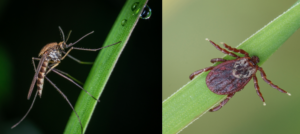The Center for Disease Control and Prevention (CDC) has announced the five-year funding renewal of the Southeastern Center for Vector-Borne Diseases (SECVBD), an interdisciplinary team of researchers that includes UNC’s Ross Boyce, MD, MSc, a member of the UNC Institute for Global Health & Infectious Diseases and assistant professor in infectious diseases and epidemiology, and Scott Commins, MD, PhD, associate professor of medicine and pediatrics in rheumatology, allergy, and immunology.
 The Southeastern Center is one of five CDC regional centers of excellence established in December 2016 in the aftermath of the Zika epidemic. It consists of research and physician scientists specializing in the study of vector-borne diseases, including those transmitted by mosquitoes and ticks, who work as a multidisciplinary team with key public health stakeholders, searching for new strategies to detect, prevent, and control vector-borne diseases in the Southeastern U.S. and Caribbean.
The Southeastern Center is one of five CDC regional centers of excellence established in December 2016 in the aftermath of the Zika epidemic. It consists of research and physician scientists specializing in the study of vector-borne diseases, including those transmitted by mosquitoes and ticks, who work as a multidisciplinary team with key public health stakeholders, searching for new strategies to detect, prevent, and control vector-borne diseases in the Southeastern U.S. and Caribbean.
As climate change and increased urbanization across the U.S. impacts the expansion of multiple diseases and their vectors, the SECVBD is well positioned to meet existing and future threats. While the Center plans to continue research on new insecticides that can kill insecticide-resistant mosquitoes and the development of mosquito surveillance techniques that can predict outbreaks of diseases, the new award substantially increases research and community-based activities related to tick-borne diseases in the Southeastern U.S. The goal of these new projects is to generate a better understanding of where ticks and tick-borne diseases are present in the region and how this information can inform control measures.

Ross Boyce, MD, MSc
Dr. Boyce, who leads the Vector-Borne Disease Epidemiology, Ecology, and Response (VEER) Hub, a multi-institutional research collaboration focused on issues of tick- and mosquito-borne diseases endemic to North Carolina, says the state lies at the “crossroads” of a national vector-borne disease epidemic.
“While North Carolina has always been a hotspot for tick-borne diseases like Rocky Mountain Spotted Fever, we’re seeing a number of concerning trends, including the continued spread of Lyme disease into the Southern Appalachians, along with the emergence of new tick-borne viral diseases such as Bourbon and Heartland viruses,” said Boyce, noting how western counties are also being impacted by La Crosse virus, a relatively neglected mosquito-borne disease that can cause brain swelling and long-term neurological disability, primarily in children.
“It’s a shifting landscape and unfortunately, I can’t say that the trend is positive. We’ve got new vectors and pathogens in new places, but not a lot of new tools.” Dr. Boyce is, however, optimistic that the Center will address some of these needs.

Scott Commins, MD, PhD
The SECVBD is also investigating alpha-gal syndrome in humans, a tick-associated allergy that has been documented with increasing cases in the Southeast. Dr. Commins is a leading national expert among the first to link the allergy to bites from ticks. He says the unique food allergy appears to develop at any time throughout life, even after many years of enjoying beef, pork or lamb. His research investigates the role of the skin and resident cells, including mast cells and basophils, in allergic immune responses.
“The more traditional presentation occurs when someone has eaten beef or barbecue in the evening, and four to six hours later they start itching and develop hives, then perhaps chest tightness and gastrointestinal symptoms are experienced, said Commins, who is the medical director of the UNC Allergy and Immunology Clinic at Eastowne. “Ultimately, those folks are diagnosed by a blood test.”
Over the last five years, the SECVBD has gained a reputation as a go-to source for quality, research-based training, and best practices for controlling diseases spread by mosquitoes, ticks, and kissing bugs, working alongside leaders of state public health and mosquito and tick control agencies in the Southeast. To date, the Center has trained more than 1,000 vector-control professionals, military personnel, and students to use integrated pest management to control mosquito- and tick-borne diseases in the Southeast, while online trainings have become popular with those outside the region as well.
The SECVBD is based at the University of Florida, which includes researchers from UF, the University of South Carolina, UNC-Chapel Hill, Florida International University, University of Miami, Old Dominion University, and Ponce Health Sciences University in Puerto Rico. Stakeholders and collaborators span academic partners, local agencies, state agencies, and federal agencies.
